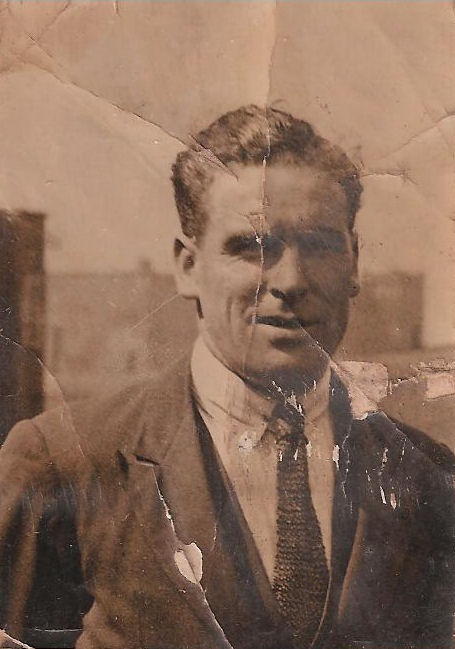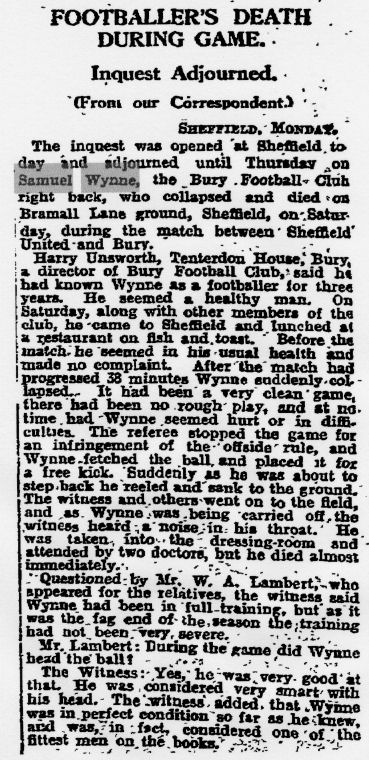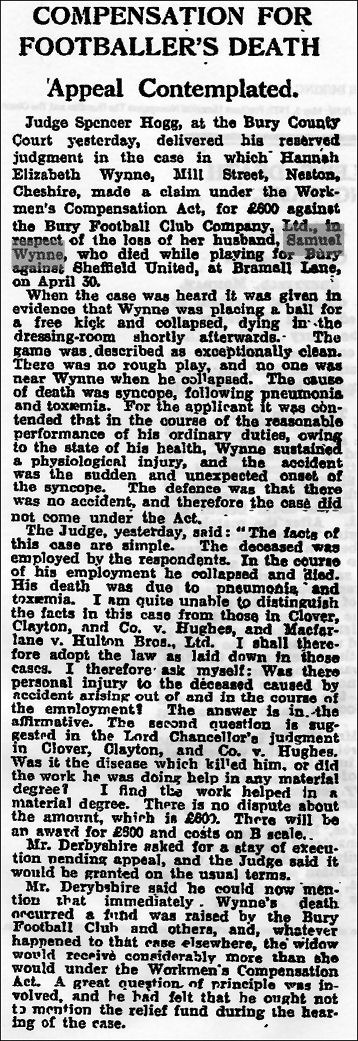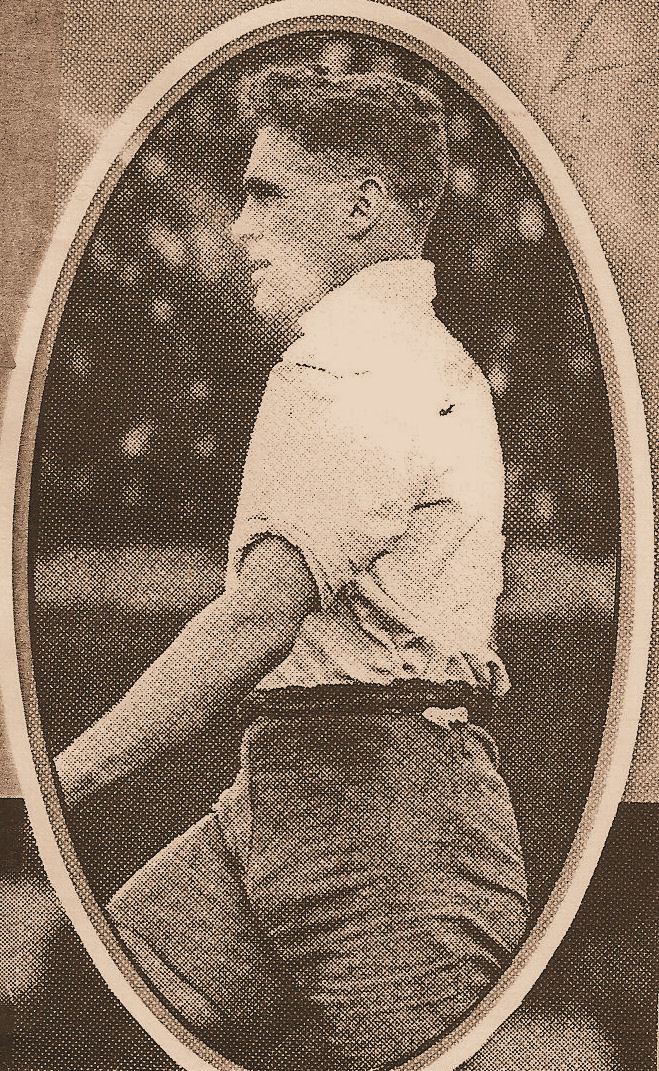
THE DEATH OF SAMUEL WYNNE - MAY 1927
"No-one could have imagined the probability of such a dramatic close to the life of Wynne"

Photo of Sam Wynne kindly supplied by Sam's granddaughter
I was researching another article for the site when I came across the following report which appeared in The Guardian dated 1st May 1927 under the title
"FOOTBALL TRAGEDY IN SHEFFIELD by our own correspondent
This Association football season so rapidly approaching its close, will be remembered for a tragedy which occurred at Bramall Lane Sheffield while the contest between Sheffield United and Bury was in progress. The interval was drawing nigh when Wynne one of the Bury backs collapsed and expired with the inevitable sequel that the match was abandoned owing to such an unprecedented fatality. It is true that men like Cropper of Grimsby and Powell of Woolwich Arsenal died after being injured in the course of play and that Robert Benson passed ------ during a game at Highbury in war time but as far as first class football is concerned the circumstances surrounding the death of Wynne in the arena whilst the match was being played have no parallel
SAMUEL WYNNE who was a native of Neston and served his country during the European war was found in the ranks of the Neston Comrades, a Cheshire League club by Oldham Athletic who engaged him. He became a reliable defender and served Oldham well - so much so that when Heap of Bury broke the tibia of his right leg at Derby on December 18, the Bury club persuaded Oldham to transfer Wynne to them just before Christmas. To his new club Wynne had been just as useful as to The Athletic. No-one could have imagined the probability of such a dramatic close to the life of Wynne, who was a finely built man of 5ft 9" and 13st. and always appeared in perfect condition."
The following day The Guardian added some additional information about the incident under the title
TRAGIC END TO BURY'S MATCH IN SHEFFIELD
Saturday's League football suffered a tragic interruption by the death of SAMUEL WYNNE thew Bury right full back during a match against the United in Sheffield which was immediately abandoned. Wynne was in the act of placing the ball in the position to take a free kick for off-side when he collapsed. He was remove d from the field on a stretcher and doctors who hastened to the dressing room found tat the player had already passed beyond their aid. Wynne was with Oldham from 1921 until three months ago when he was transferred at a considerable fee to Bury at the time that the well known defence of Gray, Wynne and Grundy was broken up...."
The Times reported on May 6th 1927 details of Sam's Inquest
BURY FOOTBALL PLAYER'S DEATH
"It was stated at an inquest at Sheffield yesterday (5th May 1927) on the body of SAMUEL WYNNE aged 30, the Bury football player who collapsed and died at the Bramall-lane football ground, Sheffield while playing against Sheffield United on Saturday, that he had been suffering from pneumonia. His death was caused by pneumonia and a verdict was recorded accordingly. Wynne's father-in-law said that when he saw him before the match he looked as though there was another ten years play in him. The referee said the game was an exceptionally clean one in every respect. He blew his whistle for an infringement of the off-side rule by the Sheffield centre forward and Wynne had placed the ball in position to take the kick when, straightening his back, he made a spiral turn and sank to the ground. The game was afterwards abandoned. The doctor said it was another case of a person having pneumonia without knowing it. Wynne also had an "athlete's heart" and playing football was the worst thing he could have done in the condition he was, but the trainer would be unable to detect anything wrong with him"
The Guardian's report is dated three days earlier

The other report I have is from The Sheffield Daily Telegraph dated 3rd May 1927
A terrible tragedy occurred on the ground of Sheffield United at Bramall Lane on Saturday afternoon. Sheffield United were playing Bury in a First Division match and five minutes before the interval Samuel Wynne the right back of Bury going down to place a ball for a free kick collapsed and died within a few minutes. The match was abandoned.
The crowd were amazed at the sudden death of the player because the manner in which he collapsed gave no indication of the tragedy. To the players it seemed that Wynne had become overcome by the heat. When the news was notified to the 15,000 spectators some 15 minutes later by club officials, it caused stupefaction and on a bright sunny day cast a profound gloominess over the gathering.
A free kick had been awarded for offside against Johnson the Sheffield United centre forward about two yards outside the penalty area and Wynne who was alone, no other player anywhere near, was bending down placing the ball for the kick, when he curled up and collapsed utterly, and laid on the turf at full length.
Everyone was astonished and there was silence for a minute.
Colleagues ran to the player also the referee Mr S Osell of Tipton Staffs, and immediately there were cries for aid. The respective trainers ran on the field and at once a call for a doctor was made. Ambulance and Mr John Nicholson, the United --- were promptly on hand and Doctor F and Doctor H L Willey were quickly on the pitch. They had been watching the game.
ANNOUNCING THE TRAGEDY
The player was carried off on a stretcher taken to the Sheffield United dressing room and placed on a couch there. He was still alive at that point and everything possible was done but after two or three minutes he was dead. The body was removed to the mortuary. The cause of death is believed to have been a haemorrhage.
Players of the Sheffield United and Bury clubs had a consultation with the referee and decided to abandon the match.
As the official notice "Match abandoned due to death of Bury player" had been carried around the ground, the majority of the people left the ground but many hung for some time and in John Street and Bramall Lane there were large numbers for a hour.
The incident which touched the superstitious in all was that Wynne was carried off, the awful climax then not being apparent, the referee and players were preparing to resume play, when it was discovered that the ball had burst. The Bury goalkeeper Richardson held it at arms length and all could see that the crumpled case had not a breath of air. What a fateful signal it was to prove. The players did not know what caused it to burst, but later in the afternoon our representative examined the ball with Mr Brelsford, the assistant trainer, and it was discovered that a tiny knot on the seam had cut the bladder, the rent being over half an inch.
BENEFIT FOR PLAYERS WIDOW
The tragedy is without parallel in the history of professional football but it is recalled that on February 19th 1916. R Benson (see note3), a former player of Sheffield United playing for the Arsenal against Reading at Highbury retired from the field of play and died having ruptured an aneurism of a mall branch of the aorta - death was due to blood flowing the pleural cavity.
Benson had not played since April 24th 1915 and had been working hard on munitions work for sometime. Moreover afew hours before he had a full meal.
Sheffield United will play the match a new with Bury at Bramall Lane next Thursday night at 6.00p.m.
The committee of Sheffield United have decided with the approval of Bury that subject to the approval of the management Committee of the League the whole of the proceeds of this match will be handed over to Wynne's widow. He was a married man and leaves a child.
It is heard that the sporting public of Sheffield will support so deserving an object. Another point has come to light in that a few weeks ago Wynne's brother was killed in an accident.
TRANSFERRED FOR £2250
Samuel Wynne who was a native of Oldham had spent all his first class career with two clubs - Oldham Athletic and Bury.
The print of the newspaper is then blurred but it does state that Sam was transferred to Bury on December 22nd 1926 as the Bury full back Heap had broken in his leg at Derby. He made his debut for Bury on Xmas day 1926 and played in every match since. It then recounts Sam's "efforts" in October 1925 when he scored two goals for each side in a game.
There have been other fatalities on the football field but I believe that Sam's was the only one to have occurred at Bramall Lane. Needless to say there is very little information available on the incident in particular and Sam's life in general. A check on the statistics revealed that Sam Wynne was playing only his nineteenth game for Bury. He was signed in December 1926 for a club record fee of £2,500 from neighbouring Oldham Athletic. And he made his home debut for Bury in their 2 - 0 win over Sheffield Wednesday on Boxing Day 1926. Since that game Sam had been ever present in the side and had actually scored from the penalty spot in one of the games. The game against Sheffield United was not going Bury's way at the time of the incident. They were losing 1 - 0 and the United centre forward had been blown up for an infringement of the off-side rule. Sam had gone to retrieve the ball and had placed the ball on the ground to take the resultant free kick. It was at this point he collapsed. Players of both sides rushed to his aid and he was stretched off the field and play recommenced. The players walked off at half time and the band struck up. It was then that a message was passed to the conductor and the music stopped. It was announced that Sam had died in the dressing room and the match was immediately abandoned. A shocked 22,000 crowd walked sombrely out of Bramall Lane.
According to the official Bury website, Sam died of a cerebral haemorrhage but the inquest makes no mention of this. However the site does say that the directors of both Sheffield United and Bury decided soon after the game that , with Football League permission, they would donate the gate receipts for the re-arranged match to Sam's widow and young child. On 5th May, a crowd of 15,000 attended the re-arranged game and raised £680 for Sam's family. This amount was more or less doubled by other donations etc. and so the dependents, in total, received a fund of around £1,400.
In April 2009, I found that there was rather an unsavoury event that should never have been allowed to arise. But given the way football was controlled and administered in the 1920's, it hardly is surprising. The event took place on 10th October 1927, just five months after Sam's death at Bury County Court. The report is from The Guardian dated 11th October 1927.

I do not know if there was an appeal against the judgement but I think I can safely say that it was not Bury F.C.s finest hour
On a final note Sam does have a another place in the history of the game. Whilst playing for Oldham Athletic in 1923 against Manchester United he scored twice for each side. Sam scored a free-kick and a penalty for Oldham and two own goals for Manchester United. Oldham eventually won 3-2. This record stood until March 1976 when Chris Nichol, the Aston Villa centre half scored all four goals in the 2 - 2 draw with Leicester City. All his goals were in open play.
On November 16th 2009, I had a very pleasant surprise when I received an e-mail from the grand-daughter of Samuel. To protect privacy the name has been removed
"I am just writing this e-mail to let you know, that
your web page actually told me more information about my Grandfather (Samuel
Wynne) than anything else I've ever been able to find out about him. For that,
I would like to say a huge, thank you. My Mother (Gwendoline Wynne) was Sam's
only daughter and eldest child. My Grandmother gave birth to a son (Samuel John
Wynne) about 8 weeks after my grandfather passed away. All the afore mentioned
have also, passed away since.
Ironically, my grandmother remarried and one of her son's from that marriage,
moved to Sheffield. After the death of my own Mother (In 1967), I lived with
this uncle (my Mother's half brother) and his wife for two years, in Woodhouse
(I was 8 years old). My Uncle, Philip Moscrop, was a local Councillor and did a
great deal of work for the local community.
Again, many thanks for helping me fill in gaps and inaccuracies about my Grandad.
My family is not reputed for its longevity!"
I responded to the mail and Sam's grand-daughter kindly supplied me with information on Sam's final resting place
"Yes, you are quite right, it was very sad and tragic for my Grandmother to lose her husband at such a young age & I can indeed, tell you where my grandfather is buried. He is buried at Raby Park Road Cemetery, in Neston on the Wirral in a family grave. Along with his Mother and Father, his brother John (Who tragically died on the last day of April in the same year). His son's ashes are also buried there. There is a large, white marble football on the grave, which is the only indication of my Grand Father's foot-balling career. I do know that he once appeared in the Guinness Book of Records, for being the only footballer (at that time) to have scored two goals and then equalise by scoring two home goals (rather embarrassing...but at least he equalised!). I noticed that you also, found that information."
I hope to go and visit Sam's grave at sometime in the near future.

Photo kindly supplied by Sam's Great Grandson - it was taken from a "Shoot" Annual
Notes
1. From Wikipedia -
William Cropper (27 December 1862 - 13 January 1889) was a cricketer and
football player who played cricket for Derbyshire CCC and football once for
Derby County. He was one of nineteen sportsmen to achieve the Derbyshire double.
Cropper was born at Brimington, Derbyshire, the son of Thomas and Mary Cropper,
and was a bricklayer.[1] Between 1882 and 1888, he played cricket for
Derbyshire. He also played for the North of England team.[2] In 60 matches he
scored 1638 runs and took 171 wickets. In 1886 he played one match for Derby
County.
From 1888 Cropper played football for the Derbyshire side of Staveley FC. While
playing for Staveley on 12 January 1889 against Grimsby Town at Clee Park,
Lincolnshire Cropper collided with Dan Doyle, the Grimsby rightback, after
fifteen minutes. He was badly injured by Doyle's knee in his abdomen and left
the field in obvious distress. The collision resulted in a ruptured bowel and he
died in the dressing room at Grimsby in the arms of his Staveley and Derbyshire
CCC team-mate George Hay.
Cropper was buried in Brimington churchyard and a fine memorial stone was
erected from the proceeds of a subscription fund raised by his family and
friends which can still be seen today.
2. From Wikipedia
Joseph Joshua "Joe" Powell (1870 – November 29, 1896) was an English
footballer who was captain of Woolwich Arsenal in their first season of League
football. He is also notable for being one of the few footballers to die as a
result of an injury incurred whilst playing.
Born in Bristol, Powell had joined the Army as a young man, and served in The
Staffordshire Regiment. He played football for the regimental team, and
impressed enough in a match against Woolwich Arsenal in October 1892 that
Arsenal bought him out of his army contract and signed him as a professional
that December. Having turned professional, Arsenal had been shunned by many
other clubs and county associations, and only competed in FA Cup matches and
friendlies. A strong and purposeful right back, Powell immediately became a
regular in the Arsenal side.
In 1893 Royal Arsenal were accepted into the Football League and joined the
Second Division. Powell captained the side in its inaugural match against
Newcastle United on September 2, 1893. Powell went on to play in all but two of
the Gunners' League matches that season, and was a near ever-present for the
next two seasons as well (missing three and five games respectively). He scored
his one and only League goal for Arsenal in a 5-0 victory over Loughborough on
January 4, 1896.
Powell started the 1896-97 season well; he played in eight of the club's first
ten Second Division matches that season. However in a United League match
against Kettering Town on November 23, he fell awkwardly and badly broke his
arm. He soon contracted blood poisoning and tetanus, and despite having the arm
amputated he died a week later at the age of 26. He had played 92 League and Cup
matches for the club, and a further 35 senior matches in other competitions.
3. From Wikipedia Robert William Benson (9 February 1883 – 19 February 1916) -
He spent eight seasons at Bramall Lane where he developed
into a strong tackler and perfected his penalty taking – all but one of his 21
goals scored for United came from the penalty spot. During his time with
Sheffield United, the club generally finished in mid-table, with their highest
finish being fourth in 1906–07.
His form brought him to the notice of the Football Association and in 1910 he
was a member of the F.A. touring party to South Africa, as well as representing
the Football League on one occasion. He received his solitary cap for England on
15 February 1913 when he played at left-back against Ireland, when England lost
2-1, with both Irish goals coming from Benson's Sheffield United team-mate Billy
Gillespie. He played 283 matches for Sheffield United in all competitions,
scoring 21 goals, including 20 penalties
Woolwich Arsenal
In November 1913 Benson joined Woolwich Arsenal, soon after they had made their
move to Highbury. He made his debut against Bristol City on 29 November 1913,
and over two seasons he made 53 appearances for the Gunners, mostly at full-back
although he was later moved to centre forward, and eventually scored seven goals
for the club as they tried for promotion back into the First Division; Arsenal
would eventually win re-election based on their position of fifth in 1914-15
after the end of World War I.
Due to the war, in 1915 first-class football was suspended. Benson quit the game
to work at the Royal Arsenal, Woolwich, munitions factory. He kept in touch with
his old club and on 19 February 1916 attended a London Combination match at
Highbury against Reading. With his former team mate Joe Shaw unable to make the
game, Benson volunteered to take his place, which ultimately had fatal
consequences. Having not played a game for nearly a year, Benson was not
match-fit. He collapsed on the pitch in the second half and had to be taken off;
soon afterwards he died in the Highbury changing rooms, in the arms of team
trainer George Hardy.
It was later determined he had died of a burst blood vessel, from a
long-standing medical condition. Benson was buried wearing his Arsenal shirt.
Three months later, Arsenal held a testimonial match in his honour, against a
Rest of London XI, with the proceeds going to his widow; over 5,000 attended to
pay their respects.[8]
Sources
The Guardian dated 1st May 1927
The Guardian dated 2nd May 1927
The Guardian dated 3rd May 1927
The Times dated May 6th 1927
The Sheffield Daily Telegraph dated 3rd May 1927
Wikipedia
This page was last updated on 15/12/09 09:26